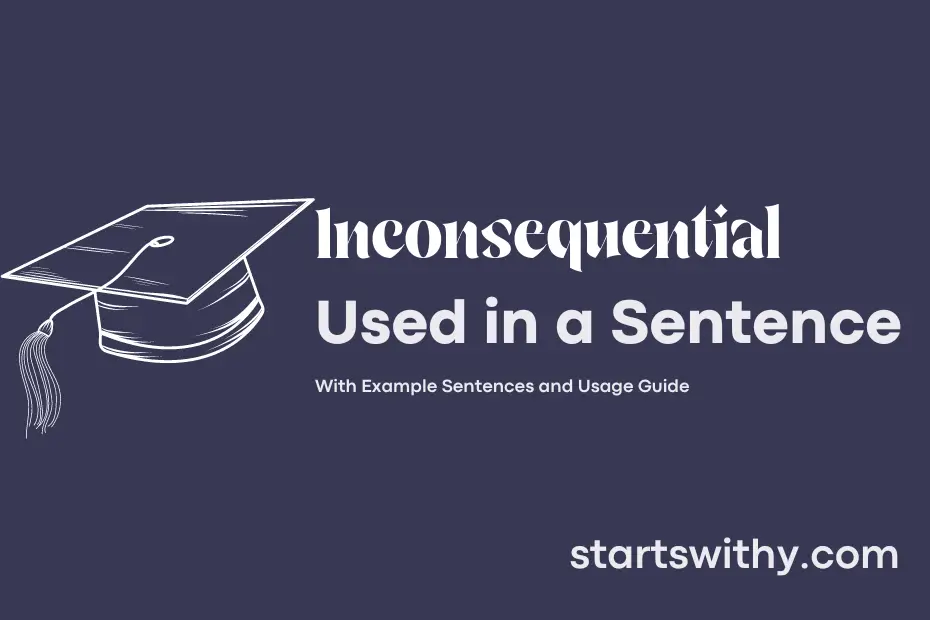Do you ever wonder how to use the word “inconsequential” in a sentence properly? Well, you’re not alone! Understanding this term is important for proper communication.
“Inconsequential” refers to something that is unimportant, irrelevant, or insignificant in the context of a situation. It is often used to describe something that lacks significance or impact.
7 Examples Of Inconsequential Used In a Sentence For Kids
- The color of your pencil is inconsequential.
- It is inconsequential whether you wear a blue or red shirt.
- The shape of your snack is inconsequential.
- The order of your storytime book is inconsequential.
- Whether you sit at this table or that table is inconsequential.
- The length of your hair is inconsequential.
- Playing with this toy or that toy is inconsequential.
14 Sentences with Inconsequential Examples
- I skipped the inconsequential parts of the textbook and focused on the important ones for the exam.
- Spending too much time worrying about inconsequential details can be counterproductive.
- I try not to get caught up in inconsequential arguments with classmates.
- The inconsequential comments made during the lecture were quickly forgotten by the students.
- I realized that stressing over inconsequential grades was not worth my mental health.
- Some students tend to get distracted by inconsequential gossip instead of focusing on their studies.
- I always prioritize my assignments based on their importance, leaving the inconsequential tasks for later.
- Engaging in inconsequential debates about politics can often lead to unnecessary conflicts among students.
- Sometimes I find it hard to stay motivated when the task at hand feels inconsequential to me.
- I try to filter out inconsequential information from various sources to stay focused on my studies.
- It’s important to differentiate between crucial feedback and inconsequential criticism when working on group projects.
- I tend to overlook inconsequential distractions in the classroom to stay attentive during lectures.
- My friends and I often joke about inconsequential matters to relieve stress during exam times.
- I try not to let inconsequential setbacks affect my overall motivation and determination to succeed in college.
How To Use Inconsequential in Sentences?
To use the word “Inconsequential” in a sentence, simply follow these easy steps:
-
Understand the meaning: Inconsequential means something that is unimportant or insignificant. It refers to things that have little or no relevance or impact on a situation.
-
Identify a situation: Look for a scenario where something minor or trivial can be highlighted. This is where you can effectively use the word Inconsequential.
-
Construct your sentence: When creating your sentence, place the word Inconsequential in a context where it clearly conveys the idea of irrelevance or insignificance. For example, “The typo in her email was inconsequential and did not affect the overall message.”
-
Practice using the word: To become more comfortable with incorporating Inconsequential into your vocabulary, try using it in various sentences and situations. This will help you become more proficient in expressing the concept of something being inconsequential.
-
Seek feedback: If you’re unsure whether you’ve used the word correctly, don’t hesitate to ask for feedback. Friends, family, or teachers can provide guidance on how to improve your sentence structure and word usage.
By following these steps, you can effectively incorporate the word Inconsequential into your vocabulary and enhance your communication skills. Remember to practice regularly and seek feedback to continue improving your usage of this word.
Conclusion
Inconsequential sentences are often trivial or unimportant in nature, lacking significance or impact on the overall context. These statements may seem insignificant or irrelevant, adding little value to the conversation or narrative. While inconsequential sentences may serve to fill space or provide a sense of continuity, they can also detract from the main points being communicated.
It is important to recognize and filter out inconsequential sentences to maintain clarity and coherence in writing or communication. By focusing on key ideas and avoiding unnecessary fillers, one can enhance the effectiveness and impact of their message. Ultimately, understanding the role of inconsequential sentences helps in crafting concise and impactful communication that conveys information efficiently.



